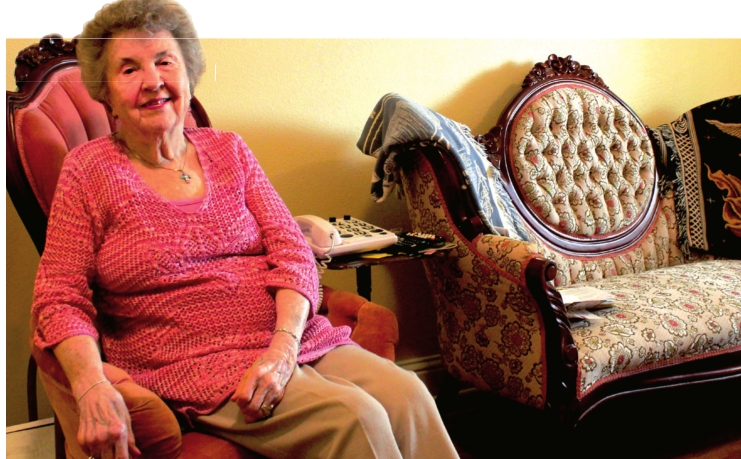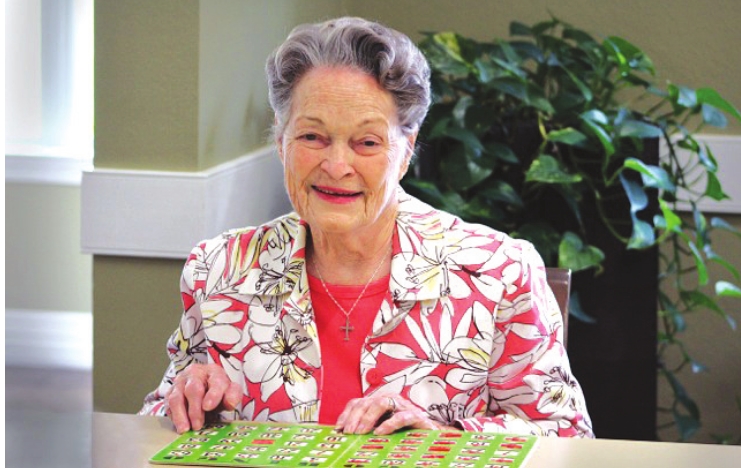

seniors and their families have housing, health-care options
Nelva O’Dell did not want to leave her home and move to The Glen with her husband, Monoah Shadrack (“Digger”) O’Dell Jr., but their sons decided it was time.
O’Dell, 89, agreed to the move, provided she could bring her piano. When movers asked where she wanted it, she said, “Put it in front of the stove because I’m not going to cook anymore.” Since then, Nelva has had a change of heart – she loves her new living arrangements.
“We don’t really have to worry about anything but where and what to eat,” she said. The couple celebrated their 68th anniversary May 7 with “a come-and-go affair” at The Glen, where Nelva sometimes performs concerts.
Mary Pease, 86, took care of her husband at home for four years after his stroke. When it was time to move Carl to a care facility, they chose The Oaks of Louisiana. After a year alone in her home, she and the couple’s Maltese, Wiley, moved there, too.
“Every day, I walked to see my husband with Wiley riding on the walker.”
Elizabeth (“Liz”) Sexton, 94, has a onebedroom at The Oaks after recovering from falling and breaking her hip. “If you can’t go home, I don’t think you could fi nd anything better. If you want to, you could stay busy every day,” she said.
Just as in any other community, there are singles, couples and pets living at both The Oaks and The Glen. While options vary depending on the residents’ wants and needs, both have a range of choices in the size of residences and the kind of services provided. Both allow overnight guests and offer religious, social and entertainment events. Choices of resort-like amenities include spa amenities with salons and exercise facilities, transportation, meals and snacks, housekeeping, laundry and from little to intensive nursing care and therapy, as needed.
The Oaks, owned and operated by Willis- Knighton Health System, has 350 residents living on a 312-acre campus. The Glen, owned and operated by The Glen Retirement System, has 122 residents and covers 52 acres. The communities, both beautifully landscaped, are less than two miles from each other just south of Shreveport.
“We have a number of
couples in independent living, some in assisted and some where one lives
in independent or assisted living and the other lives in skilled
nursing. When one or the other needs a different level of care, he or
she doesn’t have to leave campus,” said Terrie Roberts, assistant public
relations manager at The Oaks. There are numerous events encouraging
interaction with other residents and staff, and many options for
exercise including a spa, salon, outdoor exercise system and a pool, she
said.
Cheryl Foster,
director of The Stiles Apartments at The Glen, said those needing more
intensive care “are monitored by licensed nurses … able to administer
medications to the assisted living residents.” All residents have
emergency assistance available, with assisted living residents having
“housekeeping and laundry services, meal delivery and, if requested,
help bathing, dressing, grooming, transferring and toileting.”
“All
of our apartments are licensed for assisted living, so that once the
independent living residents required assisted living services they
would not have to move from their apartments. The assisted living
services can come to them without having the hassle of moving to another
location,” Foster said.
Caregivers
now number more than 65 million people or around 29 percent of the U.S.
population, according to the nonprofi t Caregiver Action Network. The
caregivers spend an average of 20 hours per week providing services and
care, responsibilities that can become challenging and exhausting and
cause the relationship to become strained.
Some
children or spouses having the very diffi cult conversation aimed at
making changes for the care of their loved ones get the response that
they will never leave home, no matter what. Scott Green, president and
co-owner with Robert Smith of Preferred Care at Home of Northwest
Louisiana, said there are options available for continuing inhome living
in many cases.
“That’s where we come in,” Green said.
“Ninety-seven percent of our inquiries come from the children.”
After
a needs assessment is made, Preferred Care works with the family to
plan the range of care and hours required. “As we mature, our needs
change. The things that were once simple to perform become complicated,"
Green said.
Both
Green and Smith hold accreditation from the Society of Certifi ed Senior
Advisors, and Preferred Care is licensed and regulated by the Louisiana
Department of Health and Hospitals. “We are a caregiver referral
service. We are like a matchmaker” between the person who needs help and
a trained health-care worker who can also cook, change the linens and
provide other services.
“In
Louisiana, sitting or companion service agencies are not regulated or
required to be licensed. They cannot provide any hands-on or personal
care which includes assistance with bathing, dressing, toileting,
grooming, transferring, ambulation and eating.
If
hands-on care is required, then a licensed home care agency is needed
(which) ensures a higher standard of care is provided,” Green said.
“We are problem-solvers,” Green said.
“We provide solutions so they can be a family again.”
– Kathleen Ward